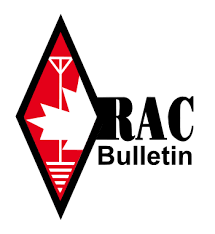RAC Ontario Sections Bulletin for July 8, 2023
Official Bulletin Station for Radio Amateurs of Canada with this week’s bulletin.
NATIONAL/INTERNATIONAL NEWS
1. Attendance Gain At Ham Radio Friedrechshafen 2023.
This year’s attendance at Ham Radio, Europe’s largest Hamfest, was up by 10% to 11,100 and the
number of vendors by 15% compared to last year.
While there were no new major radio announcements – other than we already know of from
Hamvention – it was good to see Kenwood back with a stall but a shame that only Yaesu’s agents
represented them. ICOM was there with their usual impressive large display area and competing
in size was a new company to the amateur radio market – Aaronia a manufacturer of high quality
test equipment.
— Ed Durrant DD5LP via Amateur Radio Newsline
2. FCC to Consider Keeping FM6 Radio for Low Power TV
It is shaping up to be a busy month for the Federal Communications Commission, which is considering
whether low power analog TV stations that have a Channel 6 allocation can continue to broadcast
analog FM radio.
In 13 US markets, FM broadcast audio has long been available from TV stations making use of a
subcarrier 250 kHz from the top of the Channel 6 frequencies. At the FCC’s meeting on July 20th,
the FCC will look at an option it favors: permitting these low-power TV stations to continue this
practice as a supplementary service even after the TV stations’ conversion to digital.
FM6 radio is permitted to operate only on 87.75 MHz and the service may only be offered within the
low-power TV station’s coverage area and on a non-interference basis.
— Kevin Trotman N5PRE. via Amateur Radio Newsline
ONTARIO SECTION NEWS
ITEMS OF INTEREST
3. Clipperton Island Dxpedition to Include Satellite
In case you’ve marked your calendar for January 2024, hoping to make contact with the
Clipperton Island DXpedition, there’s extra good news if you are a satellite enthusiast.
When the Perseverance DX Group call QRZ next January from Clipperton Island, they’ll have
an extra way to make contact. The team announced that the TX5S DXpedition will include satellite
operations. The team’s satellite station manager, Andreas N6NU, reported in a recent press release
that the team hopes to use the IO-117 GreenCube satellite, which not only has a generous footprint
over the island but has passes that last more than an hour.
The uninhabited atoll in the eastern Pacific Ocean will be home for the team for 16 days as they
use SSB, CW, RTTY and FT8. This is the 38th most wanted DX according to Clublog – and it is
IOTA NA-011.
— Neil Wrap WB9VPG via Amateur Radio Newsletter.
4. Morse Code is thriving in amateur radio, 24 years after last commercial use
On July 12, 1999, The final message sent in Morse code for commercial use was the same one that
Morse hammered out on his telegraph key 155 years earlier in 1844, which was, “What hath God
wrought?” But this time the message was followed by SK, meaning silent key, or deceased.
The International Maritime Organization replaced Morse code with the Global Maritime Distress and
Safety System — an automated system that use satellites and/or terrestrial radio systems with digital
selective calling technology. Morse Code is also still used in aviation. Pilots listen to a Morse code
identifier to verify that their navigation receivers are tuned to the correct radio aid, such as a VHF
Omni-Directional Range (VOR) or Instrument Landing System (ILS) approach guidance system.
Railroads stopped using Morse code in the mid-1970s. While Morse code is no longer used
commercially, it is still an integral part of amateur radio. Amateur radio operators are no longer
required to learn Morse code to obtain their license, but many learn the code on their own or by using
study guides and taking classes. Every day, amateurs around the world use Morse code to communicate
with each other, test their radio equipment, or pass along friendly information. Morse code is essential
in helping people communicate during disasters and emergencies because of its ability to penetrate
adverse weather issues and propagation disturbance.
Visit http://www.arrl.org/learning-morse-code for more information.
— ARRL news
This concludes this week’s bulletin.
Bulletin sent from Official Bulletin Manager VA3PC
RAC Ontario Sections Bulletin for July 8, 2023

